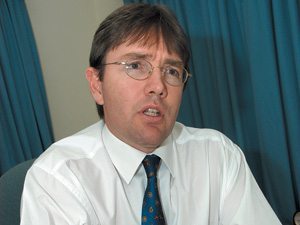
[miningmx.com] – Roger Baxter, a long-standing senior economist at the Chamber of Mines of South Africa, was recently appointed its CEO, a position he will take up in May, and at a time when the regulatory, economic and market pressures on the sector are as fierce as ever.
Miningmxasked Baxter some choice questions about where he intended to take the sector in the years ahead.
What would be your priority task as CEO?
Clearly there are a number of challenging short-term issues, including wage negotiations in the gold sector, getting clarity on the mining charter and finalisation of the MPRDA [Mineral & Petroleum Resources Development Act] amendments, dealing with the electricity challenge and other issues – such as carbon tax.
We need to ensure that the broader socio-economic environment does not compromise our industry’s competitiveness, nor that of the country, while at the same time enhancing the sustainability and transformation of the mining sector.
In the medium and longer term we need to ensure the continued role and relevance of our sector, creating the partnerships needed for a modernised mining industry of the future.
What do I see in this future?
A sector that is double its current size in terms of economic contribution, is transformed and is a catalyst for transformation, has achieved zero harm, is competitive and productive and is a sector of which South Africans can be proud.
This will take a collaborative leadership-driven partnership, bringing together a broad range of stakeholders.
So a key area of my work focus will be on implementing the chamber’s strategic plan to address both short and longer term issues, and to continue building collaborative partnerships with key stakeholders.
Critics say the chamber is a talk shop that only speaks for a portion of the sector. Thoughts?
Every organisation has its critics. In my view, the chamber is one of the most effective business advocacy organisations in South Africa, representing more than 90% of the value of mineral production in South Africa.
And, we have made a concerted effort to engage with smaller and emerging companies over the past few years, and have made some progress in doing so.
While we do not achieve every advocacy objective, the absence of the chamber in the national and international debate, would most certainly lead to more deleterious outcomes for the mining sector and the country.
And, it is not simply on an advocacy front that the chamber is active – its leadership and staff provide expert advice and fundamental support and services to the industry – from economic modelling, to employee relations, safety and health, environment and legal matters.
That said, the chamber is by no means without fault. With the support of the CEOs of the chamber’s members I certainly aim to build on the platform laid by my predecessors to further enhance the effectiveness of the chamber in the years ahead.
How do you bring the junior miners into the fold?
The chamber has been on a recruitment drive for junior miners over the past few years and we believe that chamber represents more emerging miners than any other formal mining association.
We have learnt that the emerging miners are less focused on advocacy and policy matters, but are more interested in getting assistance in the form of services and expertise to help them in their companies.
So, we have set-up the Emerging Miners Desk for this purpose, and have established a mentoring facility where previously retired mining executives are giving back their expertise to the emerging miners.
How has the role as COO and senior economist prepared you for this?
I originally joined the chamber back in 1992. This was the same year that we started the minerals policy discussions with the ANC. I have been privileged over the past 23 years to have worked with some incredible leaders from the chamber, from business, from government, from organised labour and from NGOs – too many leaders to mention here.
I have also been exposed to a large range of policy and business issues over that period including leading, or being involved in many key policy discussions with government.
As the famous philosopher Aristotle said: “To acquire knowledge, one must study, but to acquire wisdom, one must observe.”
So much of the previous 23 years has provided the solid foundation of knowledge and experience that I hope equips me for the challenges that lie ahead.
But I also have had great support from the excellent leadership team (the chamber’s president and vice-Presidents, the chamber’s CEOs) and great support from our internal Chamber team that will help us collectively realise the great potential of South Africa’s mining sector.
How will mining look in five or 10 years’ time?
I see mining as a sector that has great potential to grow investment and to further deliver transformation in the years ahead.
In fact, I believe that mining is key to helping South Africa achieve the objectives of the National Development Plan.
In the short term the industry is really struggling, with lower commodity prices all round, with many companies’ viability under threat. Binding electricity supply constraints and issues such as the proposed electricity price hikes or the introduction of a carbon tax will further undermine the viability of the sector.
And, of course, there are regulatory and labour market matters that will need to be resolved in due course. However, industry stakeholders are working collaboratively to resolve these issues, as is evidenced in the DMR and chamber seeking to jointly approach the courts for a declaratory order to promote greater regulatory certainty for the sector.
As mentioned, if we focus on the medium and longer term issues, this great industry can realise its longer term potential to double real investment and transformation by 2030.
This is a vision of a modernised, competitive, transformed, safe and prosperous mining sector that contributes significantly to the country achieving the 2030 NDP objectives for the country.
This will be a game changer for the sector and country. This is because mining really does matter for the growth, development and transformation of South Africa.











